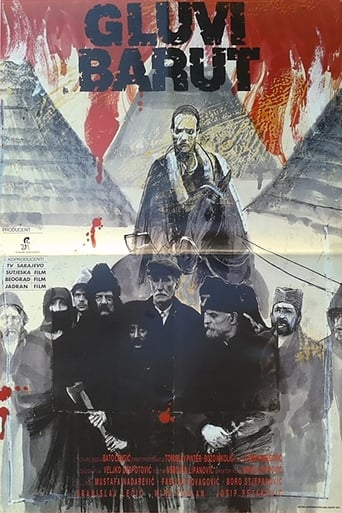



I love this movie so much
Such a frustrating disappointment
An action-packed slog
An absolute waste of money
This, the veteran Bosnian/Yugoslav director Bato Čengić's last true work, is a story that needed to be told: an alternative telling of the very important part of Bosnian and Yugoslav history, the world war 2 and its good guys, partisans. Gluvi Barut doesn't give as polished picture of the partisans as the earlier movies made in the glory days of Yugoslavia and its communist system but it is far from a judgmental film like for instance Četverored is. Its role was clear: Čengić wanted to make a film to remind the people what partisans really were, amidst a wave of increasingly liberal and anti-leftist films, mainly coming from Croatia.The story's focal point is this difficult time of conversion from royalist to new communist/Marxist Yugoslavia during the world war 2. A mountain village in Bosnia has its own militia-like force which fights the Nazis, without directly being a part of Tito's partisan army. Their commander, a former officer of the royal Yugoslav army, played excellently by Branislav Lečić, is himself torn between the two sides and unsure which side to follow: whether to retain his allegiance to the old cause or to follow the new progressive Marxist line. Radekić is proud of his officer credentials but his partisan colleagues think little of it and treat them with disdain. After a partisan commissar gets murdered by two of the members of the peasant militia, the hard willed Spanac (Spaniard) is sent to find out what happened and to reinforce the discipline among the peasants. Mustafa Nadarević is also brilliant in this part. The relations between him and his unwilling subject Radekić are at first strained. Still, Radekić tries to make things better in a difficult situation and sympathizes the cause of the partisans, seeing that they do fight for the people. However, his fellow peasants are less willing to submit to the new yoke and denounce their national identity and religious traditions. This is what this film revolves around.Another fine performance by Mira Furlan in the role of the widow peasant woman who is at first intimidated by Spaniard but later starts to develop genuine feelings for him, as she finds out he's a lonely and unhappy character. I think what's really good with this film is that at first the actions of the partisans are questioned, especially when Spanac executes some innocent peasants whom he suspected were involved in the murder of the commissar and were not willing to give up the real murderers. But as the film reaches its climax and we see Radekić make his decision to support the partisans and becomes one himself, we know that partisans are the better side here. Radekić is the only really flawless character here: he always thinks of the good of his people and doesn't join the partisan side until he carefully examines Spaniard and sees that he is true to his cause. Only then does he join partisans and then without any reservations. I find it heartwarming.Gluvi Barut is about difficult times in difficult surroundings. The desolate mountain landscapes truly reflect the toughness of life and the rough nature of its inhabitants. Spaniard is like some alien who has arrived here to make things better, but to make them better he at first has to make them worse. That is the message the director wanted to give I guess: to get things done in such a climate you sometimes have to get rough. The supporting cast is really fine and consisting of some of former Yugoslavia's finest actors. This is the real partisan movie and a realer one has never been made.
View MoreFirst of all, this is an adaptation of Branko Ćopić's novel of the same title. It is very faithful to the book, although the scope of problems covered in the book is not so wide, due to (then) still actual communist government of Yugoslavia.More than anything else, this is a story about what power does to men. The main character rules the people by fear, and little by little he starts to feel that he has the right to judge and punish everyone as he pleases.It is also a story about civil war that existed within the big war, between partisans and chetniks, but the authors decide not to take sides and position themselves only as observers. The accent is on partisan side, their beliefs and illusions, and conflicts with rustic people.This is also one of the last movies made with joint forces from Serbia, Croatia and Bosnia. This is easily seen by the cast, led by Mustafa Nadarević and Branislav Lečić, and of course great Fabijan ovagović.I recommend the movie (as well as another Čengić's work, "Mali vojnici") for its realistic approach that makes us think, and remember the verse from an Azra song: "Tko ne pamti, iznova preivljava" ("Those who forget must live through it again").
View More